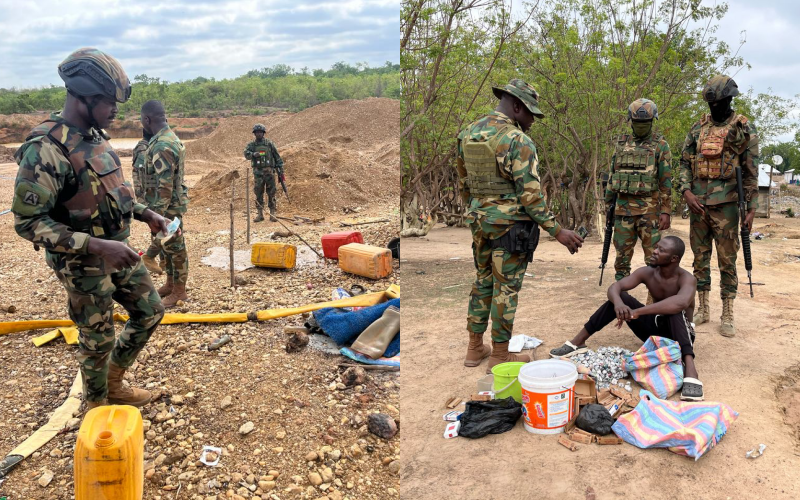The fight against illegal mining in Ghana has taken a new turn with Alhaji Collins Dauda, Chairman of the Parliamentary Committee on Lands and Natural Resources, proposing a bold strategy: the permanent deployment of a military unit within forest reserves. Dauda argues that this drastic measure is necessary due to the ineffectiveness of previous government efforts, which he describes as mere “knee-jerk reactions” to a deeply entrenched problem. He believes that a consistent military presence over several years would finally deter illegal miners, allowing for the restoration and protection of vital water bodies and forest reserves currently under siege. This proposal comes on the heels of a two-day visit by the Parliamentary Committee to Newmont mining sites in the Ahafo region, a trip designed to familiarize committee members with responsible mining operations and inform future legislative efforts.
Dauda’s frustration stems from the cyclical nature of the current approach to combating illegal mining. Task forces are deployed to affected areas, achieving temporary success, but the illegal miners invariably return once the task force departs. This recurring pattern highlights the limitations of short-term interventions and underscores the need for a more sustainable solution. Dauda emphasizes that the government cannot single-handedly tackle this complex issue and calls for collaborative action from all stakeholders, including mining companies and local communities. He specifically points to the role of mining companies like Newmont, suggesting they could contribute more to supporting local communities in their efforts to prevent environmental degradation.
The visit to Newmont’s Ahafo South Mine and Ahafo North Project sites, facilitated by the Ghana Chamber of Mines, provided the Parliamentary Committee with valuable firsthand knowledge of responsible mining practices. This experience is intended to equip the Committee with a deeper understanding of the industry, enabling them to formulate more effective laws and position mining as a catalyst for sustainable development. By witnessing firsthand the operations of a large-scale, responsible mining operation, the committee members can better appreciate the contrast with the destructive practices of illegal miners and the urgency of addressing the problem.
The dangers of illegal mining are not merely environmental; they pose a serious threat to human life. Alex Kofi Annin, General Manager of Newmont Ahafo South Mine, highlighted the inherent risks associated with illegal mining activities, particularly the use of explosives. He expressed deep concern over the loss of young lives within the communities due to these dangerous practices, urging for decisive action to halt this tragic trend. The presence of illegal miners in active mining areas further exacerbates the risks, as they often operate in close proximity to heavy machinery and other hazards, placing themselves and potentially Newmont employees in danger. Mr. Annin stressed the importance of illegal miners avoiding active mining sites to prevent further loss of life.
The issue of illegal mining extends beyond the immediate concerns of environmental damage and human safety; it has broader implications for the mining industry and the nation as a whole. Ahmed Nantogmah, acting Chief Executive Officer of the Ghana Chamber of Mines, emphasized the Chamber’s commitment to advocating for responsible mining practices. He underscored the significance of the newly elected parliament gaining a thorough understanding of mining operations in Ghana. This knowledge, he argues, is crucial for informed parliamentary discussions on the challenges, progress, and future direction of the mining sector. This understanding will allow the parliament to create legislation that supports responsible mining while simultaneously deterring illegal activities.
The proposal to deploy a permanent military presence in forest reserves represents a significant escalation in the fight against illegal mining in Ghana. It underscores the urgency of the situation and the recognition that current strategies are inadequate. While the long-term effectiveness of this approach remains to be seen, it reflects a growing consensus that a more robust and sustained intervention is necessary. This proposal, combined with the increased focus on stakeholder collaboration and educating lawmakers about responsible mining practices, signals a renewed commitment to tackling this complex challenge and protecting Ghana’s valuable natural resources. The success of this initiative will depend on the consistent implementation of the proposed measures, the active participation of all stakeholders, and a long-term commitment to addressing the underlying causes of illegal mining. The hope is that this multifaceted approach will not only curb illegal mining but also create a more sustainable and responsible mining sector that benefits all Ghanaians.














